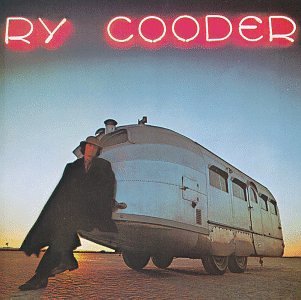Ry Cooder has a new record out and
it’s getting rave reviews all over the globe, just like all his other records
have. To be honest, he’s an artist I didn’t understand until recently. His
soundtrack for Paris, Texas has been
part of my collection in one form or another since the late 80s, and his slide
work on it has never failed to mesmerize me, but I have to admit I was kind of
stunned when I saw him clocking in at #8 on Rolling
Stone’s list of the 100 greatest guitar players of all time. Too much
technique and not enough oomph, I thought. Too NPR-friendly. Too PC. Then I
inherited a big chunk of my uncle’s record collection -- lifelong guitar
player’s stack of wax, loaded with all the gods from Django to Jimi and beyond
-- and in the middle of it are Ry Cooder’s first two albums, and I have to say,
I think old Rolling Stone got it
right.
I listen to his self-titled 1970
debut and 1972’s Into the Purple Valley constantly
now. True, he’s not a scorching guitar player. He doesn’t make his axe scream,
so he might not leap to mind when you’re compiling a canon of rock. His sound
is so laid back it’s easy to miss the amazing fretwork behind it. But it’s
there, so smooth it’s like liquid, but not so smooth that it loses its
rock-and-roll slouch and punch. His maiden and sophomore LPs are my go-to
records when I’m looking for the musical equivalent of a cold beer and a back
rub. They’re filled almost entirely with songs Cooder unearthed from the
American songbook, some of which were buried quite deep, and they’re all
reworked a little bit to bring them in line with the times, but not so much
that they shed their antique exoticness. Both records have a populist feel that
complements and nicely contrasts Cooder’s latest, Pull Up Some Dust and Have a Seat, a wide-ranging condemnation of
the corruption that has fueled the current economic crisis. They’re like
hitchhiking across the country during harder times and getting a far different
sense of America than you might get reading the morning paper or watching the
evening news. Some of the stories are the same: from “How Can a Poor Man Stand
Such Times and Live?” to “Taxes on the Farmer Feeds Us All,” which begins, “We
worked through Spring and Winter, through Summer and through Fall, but the
mortgage worked the hardest and the steadiest of us all.” But because they’re
all from the point of view of the common man, they have a warmth and sense of
hope about them that’s truly priceless. My two favorites are “F.D.R. in
Trinidad” and Dickey Doo and the Don’ts’ “Teardrops Will Fall,” both on side
one of Purple Valley -- the former
because it’s such an odd take on the New Deal, an upbeat and awkwardly worded
account of the president’s visit to the island nation, and the latter because
it’s a peerless specimen of American roots music, a song so cozy it makes me
feel warm inside every time I hear it, despite the heartbreak lyrics.
Both records end with shining
examples of Cooder’s slide-guitar skills, Purple
Valley with a foreboding recast of Woody Guthrie’s “Vigilante Man,” and his
debut with Blind Willie Johnson’s “Dark is the Night,” the song he’d later use
as the thematic foundation of his Paris,
Texas soundtrack. Cooder conjures the depths and complexities of human
emotion with his six strings on that number with a masterfulness that’s on par
with any great artist in any medium across the ages, let alone guitarists.




No comments:
Post a Comment